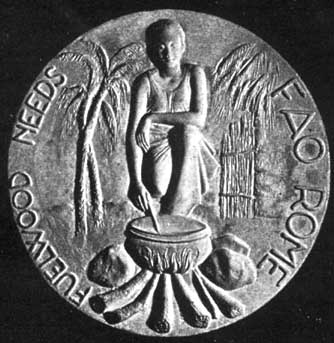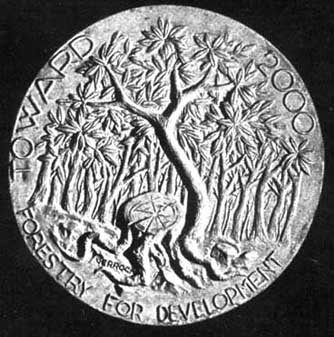D.M. Lantican and R.A. del CastilloD.M. LANTICAN is the Vice-Chancellor for Administration, University of the Philippines at Los Baños. R.A. DEL CASTILLO is National Director, Centre for Forestry Education Research and Development for the Asia and Pacific Region, Laguna, Philippines.
The need to collect and advance knowledge about the complex tropical ecosystems is keenly felt by developing countries especially' and we can expect this awareness to increase.
Forestry education in Southeast Asia has been deterred by two factors, the Second World War and the emergence of the countries in the region into independent nations. The Second World War cut these countries off from new technology for the duration. Then, independence from the western colonial powers created a vacuum of highly trained foresters, especially expatriates who left countries such as Burma, Indonesia and Malaysia. These problems were compounded by the lack of proper post-graduate facilities. At present, there are comparatively few seasoned experts in the region in relation to the large body of young foresters who have graduated in recent years and should be given advanced education.
Realizing the pressing need to engage in the creation of forestry manpower at the graduate level, the countries in the region soon embarked on the development of their staff and facilities. The staff development programme started by the College of Forestry, University of the Philippines at Los Baños (UPLB-CT), and a few other schools in the region included not only a programmed build-up of the staff but also a fellowship programme that enabled the staff to work for advanced degrees abroad. Over a period of about 10 years, the UPLB-CF built up sufficient capability to enable it to start offering masters' programmes in 1966. Eight years later it started offering a doctoral programme.
Experience showed that advanced training in developed western countries was much too expensive for Asian students. In addition, the relevance of the courses in the student's country has often been criticized. For these, and possibily other minor reasons, the emerging trend in post-graduate education in these countries is to work for the graduate degree locally or in other countries in the region where a strong programme exists for the required field of specialization.
A better approach aimed at self reliance in post-graduate education within the region is the establishment of formal institutional arrangements whereby greater cooperation among the leading educational institutions is possible. This calls for common efforts among these institutions to develop physical and human resources, including stepped-up activities in every aspect of forestry. A trend in this direction is very evident in almost al! the countries of Southeast Asia, particularly in Indonesia, Malaysia, Philippines and Thailand. No country in the region can yet be entirely self-sufficient in forestry higher education. Each country needs the enriching experiences of other countries. This is especially true for tropical forestry studies since most forestry knowledge concerns temperate forests. The need to collect and advance knowledge about the complex tropical ecosystems is keenly felt by developing countries especially and this awareness can be expected to increase.
Philippines. The College of Forestry, University of the Philippines at Los Baños (UPLB), gives graduate training leading to the Master's and Ph.D. degrees. The former is usually a two year programme while the latter is three to four years. There is a faculty of 70, of whom 21 hold Ph.D. degrees, 28 have M.Sc. degrees and the rest are in various stages of completing the Master's degree. The staff is active in research funded mostly from grants from donor government agencies and from the wood industry. The facilities and equipment include a library of more than 21000 books and periodicals. There is a 4000-ha school forest.
During the last 10 years, the university has granted graduate degrees to nationals of Thailand, Viet Nam, Democratic Kampuchea, Indonesia, Malaysia, Liberia and the Philippines.
Thailand. The Faculty of Forestry of Kasetsart University in Thailand offers graduate training leading to the M.Sc. degree in the following major fields of specialization: forest management, forest products, forest biology, silviculture and watershed management. The minimum credit requirement is 36 units exclusive of the nine credit units required for the thesis. The average length of time to earn the degree is two years. The faculty staff totals 60, composed of 20 Ph.D., 27 M.Sc. and 13 B.Sc. degree holders. No expatriates are employed. The facilities include a forest products laboratory, an aerial-photo interpretation and remote sensing laboratory, a forest soil and hydrology laboratory, a microscopy laboratory, a greenhouse and an insectary. The library holding consists of 10825 volumes comprising books and periodicals.
Research is financed by the University which gets its funding from the Government. The Faculty of Forestry of Kasetsart University is the only university-level academic institution in forestry in Thailand.
Indonesia. The Faculty of Forestry of the Institut Pertanian Bogor (Bogor Agricultural University) is the oldest forestry school in Indonesia. It offers graduate work at master's level. It has good facilities and a fairly strong staff composed of seven Ph.D., 5 M.Sc. and 30 B.Sc. degree holders. Its library has a collection of books and periodicals in Bahasa Indonesia and selected foreign languages. The school is located near the Southeast Asia Regional Centre for Tropical Biology (BIOTROP), the Forest Research Institute and the Forest Products Research Institute.
The Faculty of Forestry of Gadjah Mada University, Yogyakarta, provides graduate training in forestry leading to the M.Sc. degree. As of 1977, it has a faculty of 51 consisting of two with Ph.D. degrees, three with M.Sc. degrees, 24 with B.Sc. degrees and 22 with Diplomas in Forestry.
DETERMINING THE OPTIMAL CUT at the Forest Products Research Institute, Los Baños
Malaysia. The Faculty of Forestry of the University Pertanian Malaysia has a vigorous development programme. It has offered an M.Sc. degree programme since 1978/79. It has a faculty of 20, consisting of four with Ph.D. degrees, five with M.Sc. degrees and 11 with B.Sc. degrees, but the staff development programme is continuing.
The Fao forestry medal


Forestry for Development is the message of this striking FAO forestry medal. In gold, silver or bronze, it is an ideal personal memento. As a gift it will be valued and appreciated. One side shows the importance to man of wood for fuel and shelter. The renewability of forests through rational management is depicted on the other side with a new tree growing from the stump of an old one. The medal underlines the urgent need to increase fuelwood production as recommended in the FAO study AGRICULTURE: TO WARD 2000. The Forestry Medal is part of the FAO Coins and Medal Programme's concentration on forestry themes in 1984, the year of the 9th World Forestry Congress to be held in Mexico. Readers of UNASYLVA receive a 10 % discount. Use the order form.
Send this coupon to: Medals Programme (B-111) - FAO - Rome
|
Fao Forestry Medal |
Quantity |
Full price US$ |
Discount price US$ |
|
gold (18 carat) 28 mm (9/10 in.) |
|
280 |
252 |
|
sterling silver (925) 50 mm (2 in.) |
|
65 |
59 |
|
bronze 50 mm (2 in.) |
|
25 |
18 |